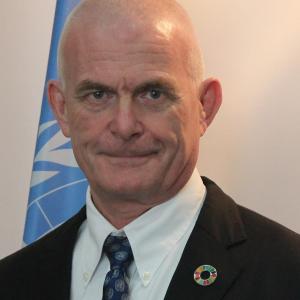Monday 13 August 2018
Your excellency, Minister of Social Welfare, Relief and Resettlement, U Win Myat Aye, Dignitaries, Distinguished Participants, Colleagues, Ladies and Gentlemen
Thank you for joining us today at this important workshop on the implementation of the Rakhine Advisory Commission’s recommendations.
Our dialogue and cooperation will be crucial for making further progress towards the vision of what the Rakhine Advisory Commission’s final report title terms as a “Peaceful, Fair and Prosperous Future for the People of Rakhine”.
Let me begin by expressing my appreciation to the Government of the Union of Myanmar for leading the implementation of the Commission’s Recommendations. I know that this is also inspired by the Rakhine Socio-Economic Development Plan, which was also completed in draft form in 2017.
The State Counsellor’s Office issued a statement on 24 August 2017, announcing that the Government “will give the report our full consideration with a view to carrying out the recommendations to the fullest extent, and within the shortest timeframe possible, in line with the situation on the ground.”
Our intent is to provide the Government with adequate support to succeed in carrying out all the Recommendations and addressing the root causes of the crisis, including securing of freedom of movement, safety and identity for all residing in Rakhine State.
The steps undertaken by the Government so far are encouraging. A number of project interventions have been undertaken, and some coordination structures established. But as we all know, much remains to be done for Rakhine State. I hope this workshop will help us come together and draw on everyone’s capacities to move this work forward.
On this occasion, I believe that I speak on behalf of the entire international community when I say that we are placing the humanitarian, development and human rights needs of all the communities in Rakhine at the center of our attention. We stand ready to offer more support to the implementation process if given the space and opportunity, and if able to work in accordance with international standards and principles.
In order to better focus our efforts around these urgent needs, the international community came together a few months ago around “A Strategic Framework for International Engagement in Rakhine”. This is one step of the way towards an implementation plan that can harness the efforts of all partners in supporting the implementation of all the Recommendations. To help structure our work, the Strategic Framework sets out four main areas:
· Protecting all people, strengthening resilience and resolving issues of statelessness.
· Sustainable access to services and livelihoods opportunities.
· Sustainable peace and a stable society.
· Refugee return and reintegration.
The dramatic events of the past 12 months have made these needs even more urgent. For that reason, we are prepared to redouble our efforts to reach all communities irrespective of ethnicity, religion or citizenship status – as envisaged by the Rakhine Advisory Commission recommendations and the Rakhine Socio-Economic Development Plan.
This work is also inter-connected with the Tripartite MoU signed by the Government of Myanmar, UNHCR and UNDP. The successful implementation of the recommendations of the Rakhine Advisory Commission’s may be crucial to create a conducive environment for the return of refugees.
The UN is also discussing with the Government on a strategy to close the IDP camps which looks at finding sustainable solutions to the IDPs in line with the Rakhine Advisory Commission recommendations and the international standards.
Again, I am greatly encouraged that the Government has convened this workshop and hope it will be an important step towards bringing our efforts together around all these important recommendations. While others will speak to you about the workshop itself, please also allow me to share my own views of what could be some very useful outputs from this workshop:
· An arrangement for regular and structured cooperation between the Government’s Implementation Committee, and the international community.
· A shared vision of how we can broaden this dialogue and continue to make it more inclusive.
· A joint understanding of how we could develop a specific action plan, including timelines, roles and indicators that will make our combined work more effective, efficient and targeted.
Let us make this workshop a step forward in our dialogue and cooperation.
Thank you for your attention.
Download PDF version


